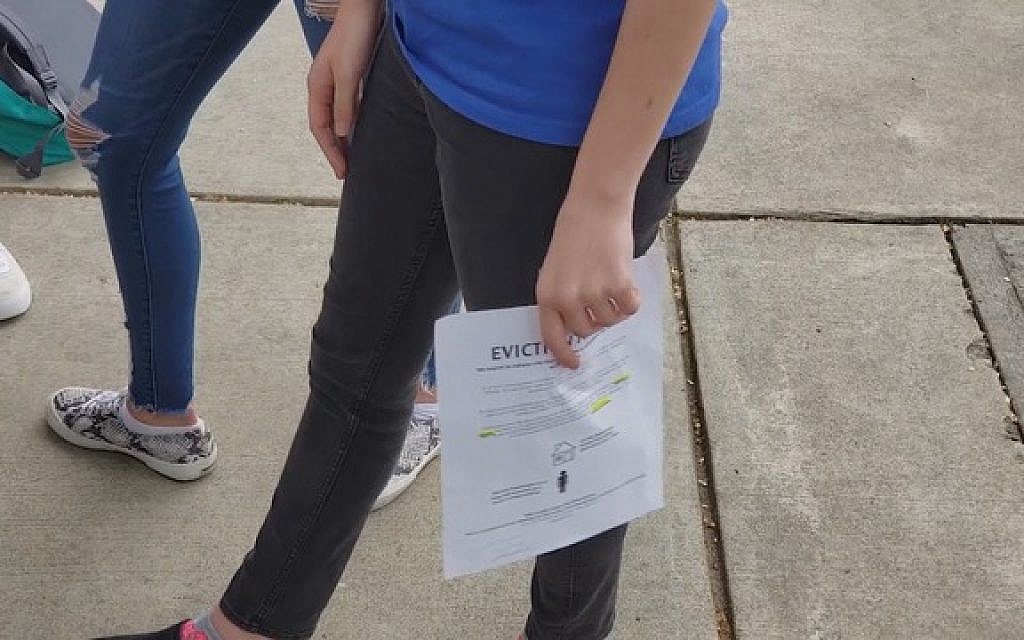Emory’s Open Expression Policy Put to the Test
There was a certain irony in Emory University hosting a conference on “Academic Freedom and Free Speech on Campus” two weeks prior to the eviction notice incident.
Dave Schechter is a veteran journalist whose career includes writing and producing reports from Israel and elsewhere in the Middle East.
There was a certain irony in Emory University hosting a conference on “Academic Freedom and Free Speech on Campus” and two weeks later finding itself embroiled in a dispute over what some might term the limits of free speech.
Given the acrimony between pro-Israel and pro-Palestinian students, Emory’s administrators may be relieved that the spring semester is nearly over and that students will be leaving campus for the summer.
The mock-eviction notice incident tested Emory’s Respect for Open Expression Policy, which promotes “courageous inquiry through open expression, dissent, and protest, while acknowledging the challenges of the creative tensions associated with courageous inquiry in an ever changing community.”
Additionally, “Civility and mutual respect are important values in our community; while they do not limit the rights protected by this Policy, we ask all members of the Community to consider these values carefully when exercising their fundamental right to open expression.”
Emory Students for Justice in Palestine no doubt viewed the eviction notices, which appeared April 2 on dormitory doors and at an off-campus residence and were intended to highlight Israel’s demolition of Palestinian homes, as a legitimate example of “open expression, dissent, and protest.”
Over the past decade, variants of the flyer have appeared on campuses across the country.
After initially putting its stamp on the flyer, Emory’s Residence Life Office ordered them removed for violating a policy against posting notices on doors without the occupant’s consent. The university admitted that its policy on posting flyers needs revision.
The flyers were posted as part of Israel Apartheid Week, which coincided with Emory Israel Week, organized by the campus Eagles for Israel. Many Jewish students – along with parents, alumni and community members – saw the eviction notices as something less than “civility and mutual respect.”
In trying to walk a middle ground in its response, Emory’s administration left itself open to criticism by parties on both sides of the dispute.
The university thus far has side-stepped the “severe consequences” against SJP called for by Jewish communal organizations. Those seeking harsher action have been left dissatisfied, even as Emory’ President Claire E. Sterk acknowledged the “personal pain” felt by Jewish students and others in the community.
“All of us are aware that anti-Semitic incidents are on the rise on college campuses and throughout American society today,” Sterk said. “It is in that context of escalating intolerance that our Jewish students found the mock-eviction notices.”
College is where assumptions of knowledge and certainties about the world should be challenged and where young people, removed from the cocoon, learn something about navigating conflict and developing resilience.

In another day, when children went off to college, parents had little awareness of events on campus. Parents might receive the occasional telephone call or letter from their offspring, with a brief update of how classes were going and maybe mention of an extracurricular activity or a social relationship.
Back then, colleges acted “in loco parentis,” a Latin phrase meaning “in place of a parent.”
Today, parents call their children away at college and expect their children to call them, or to at least answer a text.
Social media allows parents to stay informed on campus news, by reading the university’s official accounts and the student newspaper, and by following the groups their children join and even “friending” their friends.
When an incident such as the mock-eviction notices occurs, parents – helicoptering above their children’s lives – can swoop down and attempt to smooth the pavement and remove obstacles blocking their path. Unfortunately, some Jewish parents called and berated Emory staff.
The incident also prompted invective on websites that focus on news in the Jewish world.
Blog posts excoriated Jewish faculty for their supposed silence (overlooking a prominent professor quoted in this newspaper), claimed that Jewish students were selectively targeted (even after both the university and Jewish groups said that was not the case), and contained a myriad of mistakes involving basic facts.
When the students return in four months, so will tensions between the pro-Israel and pro-Palestinian groups. As they plan for the fall semester, perhaps Emory’s administrators will consider bringing these students together for the kind of dialogue that will help all concerned navigate whatever comes next.




comments